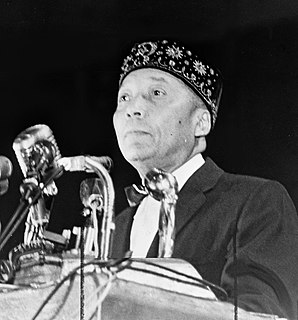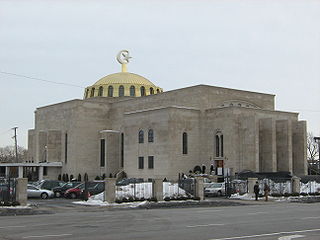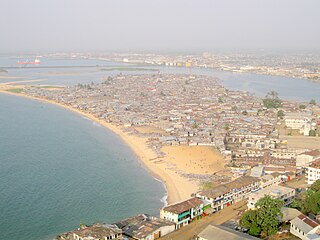Claude Clegg (full name: Claude Andrew Clegg III) is a historian who specializes in the history of the African diaspora in the Americas. He is currently the Lyle V. Jones Distinguished Professor at the University of North Carolina at Chapel Hill, with a joint appointment in African, African American, and Diaspora Studies.
Clegg holds a BA from the University of North Carolina at Chapel Hill and a PhD from the University of Michigan.
Clegg has written several books, including The Black President: Hope and Fury in the Age of Obama, An Original Man: The Life and Times of Elijah Muhammad, Troubled Ground: A Tale of Murder, Lynching, and Reckoning in the New South, and The Price of Liberty: African Americans and the Making of Liberia.

Malcolm X was an African-American Muslim minister and human rights activist who was a prominent figure during the civil rights movement. A spokesman for the Nation of Islam until 1964, he was a vocal advocate for black empowerment and the promotion of Islam within the black community.

Rowan County is a county in the U.S. state of North Carolina that was formed in 1753, as part of the British Province of North Carolina. It was originally a vast territory with unlimited western boundaries, but its size was reduced to 524 sq mi after several counties were formed from Rowan County in the 18th and 19th centuries, as population increased in the region. As of the 2010 census, its population was 138,428. Its county seat, Salisbury, is the oldest continuously populated European-American town in Western North Carolina.

Elijah Muhammad was an American religious leader, black separatist, and self-proclaimed Messenger of Allah, who led the Nation of Islam (NOI) from 1934 until his death in 1975. Muhammad was also the teacher and mentor of Malcolm X, Louis Farrakhan, Muhammad Ali, and his own son, Warith Deen Mohammed.

Buchanan, also previously known as Grand Bassa on some maps, is the third largest city in Liberia, lying on Waterhouse Bay, part of the Atlantic Ocean. As of the 2008 census, Buchanan has a population of 34,270. Of this, 16,984 were male and 17,286 female.
Richard John Alexander Talbert is a British-American contemporary ancient historian and classicist on the faculty of the University of North Carolina at Chapel Hill, where he is William Rand Kenan, Jr., Professor of Ancient History and Classics. Talbert is a leading scholar of ancient geography and the idea of space in the ancient Mediterranean world.

James Iver McKay was a member of the United States House of Representatives from North Carolina. He was born in 1792, near Elizabethtown, North Carolina. He pursued classical studies and then law. He was appointed United States attorney for the district of North Carolina on March 6, 1817, and also served in the North Carolina General Assembly. He was elected as a Jacksonian to the 22nd through 24th congresses (1831–1837) and as a Democrat to the 25th through 30th congresses (1837–1849). He served as chairman of the: Committee on Military Affairs, Committee on the Post Office and Post Roads, Committee on Expenditures in the Department of War, Ways and Means Committee. He was also the chief sponsor of the Walker Tariff of 1846; and was the favorite son of the North Carolina delegation at the 1848 Democratic National Convention for Vice President. McKay also introduced the Coinage Act of 1849 on the House floor, with it successfully passing.

Jointly presented by the Southern Regional Council and the University of Georgia Libraries, the Lillian Smith Book Awards' honor those authors who, through their outstanding writing about the American South, carry on Lillian Smith's legacy of elucidating the condition of racial and social inequity and proposing a vision of justice and human understanding.

The Back-to-Africa movement was based on the widespread belief among some European-Americans in the 18th and 19th century United States that African Americans would want to return to the continent of Africa. In general, the political movement was an overwhelming failure; very few former slaves wanted to move to Africa. The small number of freed slaves who did settle in Africa—some under duress—initially faced brutal conditions. As the failure became known in the United States in the 1820s, it spawned and energized the abolitionist movement. In the 20th century, the Jamaican political activist and black nationalist Marcus Garvey, members of the Rastafari movement, and other African Americans supported the concept, but few actually left the United States.
John Kizell became known as a leader in Sierra Leone as it was being developed as a new British colony in the early nineteenth century. Believed born on Sherbro Island, he was captured and enslaved as a child, and shipped to Charleston, South Carolina, where he was sold again. Years later, after the American Revolutionary War, during which he gained freedom with the British and was evacuated to Nova Scotia, he eventually returned to West Africa. In 1792 he was among 50 native-born Africans among the 1200 mostly African-American Black Loyalists who were resettled in Freetown.

Cape Mesurado, also called Cape Montserrado, is a headland on the coast of Liberia near the capital Monrovia and the mouth of the Saint Paul River. It was named Cape Mesurado by Portuguese sailors in the 1560s. It is the promontory on which African American settlers established the city now called Monrovia on 25 April 1822.
Elijah Johnson was an African American who was one of the first colonial agents of the American Colonization Society in what later became Liberia. He was probably born in New Jersey, and received some limited schooling in New Jersey and New York. He served as a soldier in the War of 1812 and studied for the Methodist ministry.

Muslim Girls Training & General Civilization Class is the all-female training program of the Nation of Islam. It is often considered to be the counterpart for girls and women to the Fruit of Islam.

Bushrod Island is an island near Monrovia, Liberia surrounded by the Atlantic Ocean, the Saint Paul River, the Mesurado River and Stockton Creek. It contains the Freeport of Monrovia, the major national port of Liberia and a variety of businesses. It also contains numerous residential areas and government buildings. There are four towns on the island, Vai Town, New Kru Town, Logan Town and Clara Town.

New Georgia is a township in Montserrado County, Liberia that was first settled by Africans who had been taken from slave ships seized or wrecked near the United States and then sent to Liberia after several years had passed.

The Hate That Hate Produced is a television documentary about Black nationalism in the United States, focusing on the Nation of Islam and, to a lesser extent, the United African Nationalist Movement. It was produced in 1959 by Mike Wallace and Louis Lomax.
Arthur Franklin Raper was an American sociologist. He is best known for his research on lynching, sharecropping, and rural development.

The Peace Movement of Ethiopia was an African-American organization based in Chicago, Illinois. It was active in the 1930s and 1940s, and promoted the repatriation of African Americans to the African continent, especially Liberia. They were affiliated with the Black Dragon Society.
The Prospect Hill Plantation was a former 5,000-acre plantation in Jefferson County, Mississippi. In the early 19th century, the plantation was owned by planter Isaac Ross of South Carolina, who enslaved African American people to farm cotton as a cash crop. In 1830, Ross and other major planters co-founded the Mississippi chapter of the American Colonization Society, which sought to move enslaved people to Mississippi-in-Africa, a colony on the coast of what became Liberia.
The Port Cresson massacre was a lopsided battle that occurred on June 10, 1835, in the territory of modern-day Liberia between former American slaves and descendants of American slaves on the one hand and Bassa forces on the other.

Liberia–Turkey relations are the foreign relations between Liberia and Turkey. The Turkish ambassador in Accra, Ghana is also accredited to Liberia since 2013. Liberian Embassy in Brussels is accredited to Turkey. Turkey will be opening an embassy in Liberia’s capital Monrovia 'as soon as possible.'